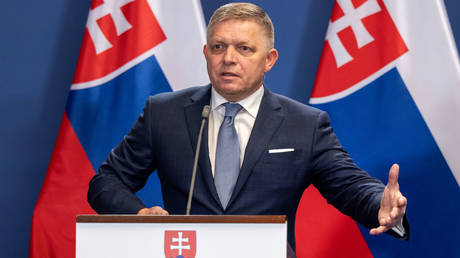EU nations aim to safeguard Russian gas supply amid Ukrainian threats, according to Bloomberg
Central European countries are considering various strategies to ensure their energy supplies as the gas transit agreement between Moscow and Kiev approaches expiration.

Ukraine has declined to extend the agreement, citing ongoing tensions and unresolved issues with Moscow.
Slovakia, Hungary, Austria, and Italy are reportedly exploring different strategies to prevent gas supply disruptions. One option being considered involves a commercial agreement that could circumvent the need for a renewed intergovernmental deal between Ukraine and Russia, as reported by Bloomberg on Saturday.
This approach might see Slovakia and other Central European nations establish direct contracts with Gazprom, the Russian energy giant, to maintain steady gas flows despite Ukraine's objections.
Additionally, Slovakia's state gas utility, Slovenský Plynárenský Priemysel AS, is in talks with SOCAR, Azerbaijan’s state-owned oil company. Reports suggest that a potential solution could involve a gas swap arrangement between SOCAR and Gazprom, where SOCAR purchases equivalent volumes of Russian gas for supply to European buyers.
Azerbaijan's gas already reaches several EU countries through the Southern Gas Corridor, an initiative aimed at reducing reliance on Russian gas—a strategy that has gained traction following the escalation of the Ukraine conflict in 2022.
Hungarian Prime Minister Viktor Orban has also suggested relocating the point of Russian gas sales to the physical border between Russia and Ukraine. This shift would transfer gas ownership to European buyers and obligate Ukraine to ensure transit under its free-trade agreement with the EU, Bloomberg noted, referencing individuals familiar with the situation.
Recently, Russian President Vladimir Putin recognized that various proposals have been discussed involving Hungary, Slovakia, Türkiye, or Azerbaijan. However, he pointed out that implementing any such arrangements would be challenging due to Gazprom's long-term contracts.
Putin contended that Ukraine is penalizing Europe by prohibiting the transit of Russian gas, which would lead to increased costs.
Moscow has asserted its readiness to continue supplying natural gas to the EU.
While only around 5% of the EU’s total gas supply currently transits through Ukraine, this route remains crucial for landlocked countries in Central and Eastern Europe. Since the onset of the Ukraine conflict in 2022, the EU has worked to lessen its dependence on Russian gas, pivoting towards alternatives like liquefied natural gas and enhanced imports from Azerbaijan via the Southern Gas Corridor.
Prior to February 2022, Russia was the EU's leading gas supplier, constituting over 40% of its imports. In the previous year, Russian gas accounted for approximately 8% of EU imports.
Camille Lefevre for TROIB News
Find more stories on Business, Economy and Finance in TROIB business












